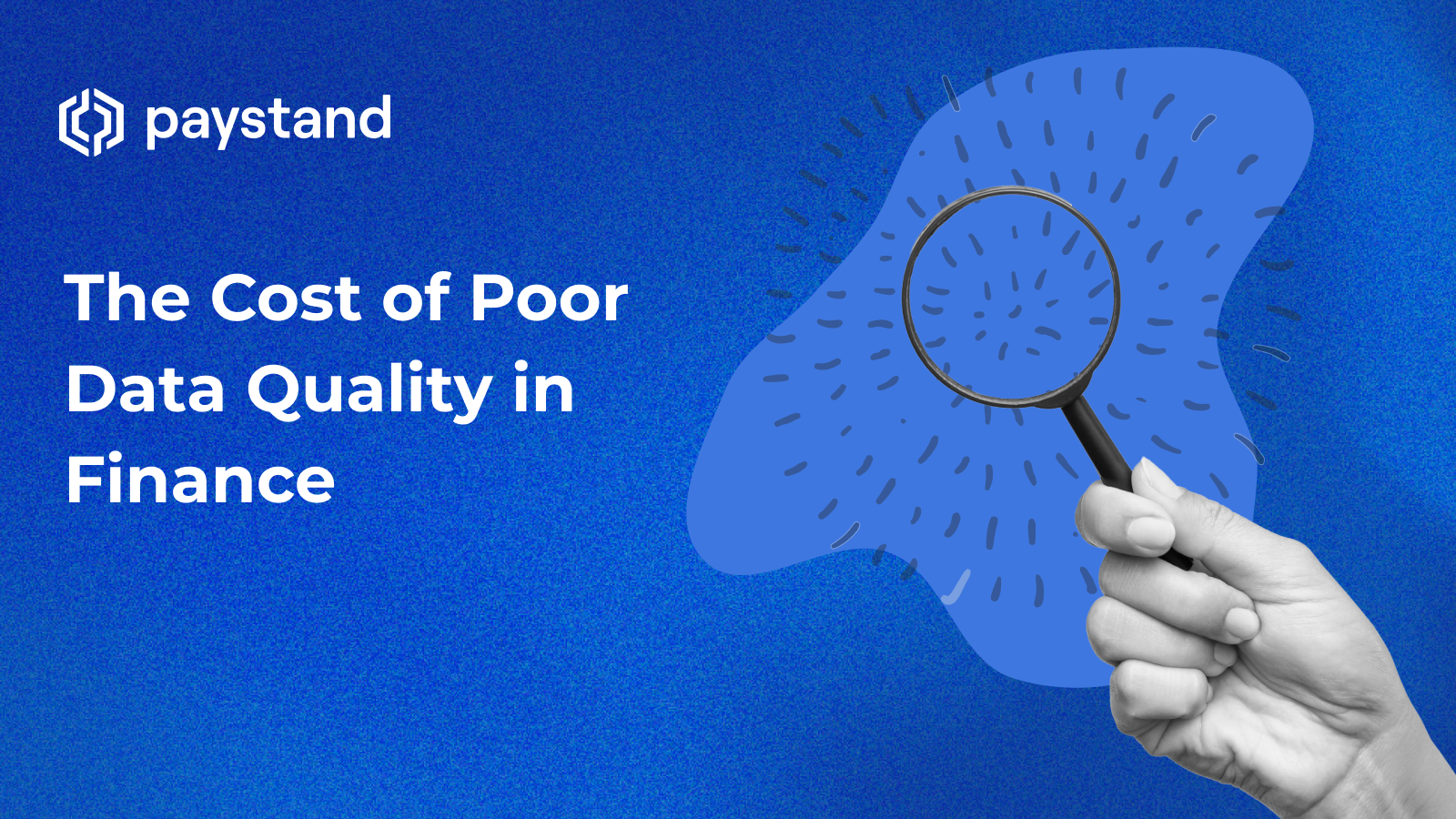The Cost of Poor Data Quality in Finance

Table of Contents
- The Cost of Poor Data Quality in Finance
- What is Financial Data Quality?
- Broader Impacts of Poor Financial Data Quality
- Common Challenges in Maintaining Financial Data Quality
- How Paystand Addresses Financial Data Quality Issues
Key Takeaways
- Poor financial data quality costs the financial sector an estimated $15 million annually, impacting operational efficiency, compliance, and financial reporting.
- Manual processes, data discrepancies, and lack of real-time updates are common challenges in financial data quality management.
- Paystand offers innovative solutions to enhance financial data quality, including Smart Lockbox, ERP integration, real-time reconciliation, blockchain technology, and robust compliance measures.
The High Cost of Inaccurate Data
The financial sector loses an estimated $15 million annually due to poor data quality, according to Gartner. This alarming statistic underscores the critical importance of maintaining accurate and reliable financial data. As business financial management increasingly relies on data-driven decisions, the cost of inaccuracies—from operational inefficiencies to compliance risks—continues to rise.
What is Financial Data Quality?
Financial data quality refers to the accuracy, consistency, completeness, and timeliness of financial data. High-quality financial data is essential for effective decision-making, reliable financial reporting, and compliance with regulatory standards. Without it, organizations face significant risks that can undermine their success and reputation.
Broader Impacts of Poor Financial Data Quality
Poor financial data quality affects various aspects of business operations, including:
- Financial Reporting: Errors in data lead to inaccurate financial statements, which can result in loss of investor trust and regulatory penalties.
- Operational Efficiency: Manual corrections and reconciliations slow down processes, leading to higher operational costs.
- Compliance: Inaccurate or incomplete data can lead to non-compliance with industry regulations, exposing organizations to legal and financial repercussions.
Common Challenges in Maintaining Financial Data Quality
Maintaining high-quality financial data is fraught with challenges, including:
- Manual Data Entry Errors: Human errors during data entry can compromise data integrity.
- Discrepancies in Financial Reporting: Mismatches in data sources result in inconsistent reporting.
- Inefficient Reconciliation Processes: Manual reconciliation is time-consuming and prone to errors.
- Lack of Real-Time Updates: Outdated data limits decision-making accuracy and responsiveness.
How Paystand Addresses Financial Data Quality Issues
Paystand provides a suite of innovative solutions to tackle these challenges and ensure superior financial data quality:
Smart Lockbox and Smart Check Solutions
Paystand’s Smart Lockbox digitizes paper checks and automates the capture of payer information, significantly reducing manual data entry errors. This process not only enhances data accuracy but also streamlines workflows and allows you to work toward digital transformation.
ERP Integration with NetSuite and Sage Intacct
Seamless integration with leading ERP systems like NetSuite and Sage Intacct ensures that payment data is accurately synced and reconciled with financial records. This eliminates discrepancies and provides a single source of truth for financial data.
Real-Time Reconciliation
Paystand’s real-time reconciliation technology automatically matches payments to invoices and accounts. This minimizes discrepancies, improves data accuracy, and accelerates the reconciliation process.
Blockchain Technology
By leveraging blockchain technology, Paystand provides an immutable ledger that enhances transparency and prevents fraud. This ensures that financial data remains secure and tamper-proof.
Compliance and Security
Paystand adheres to industry standards to safeguard financial data integrity. Robust compliance measures ensure that businesses meet regulatory requirements while maintaining data accuracy and security.
Financial data quality is a cornerstone of successful financial operations. Poor data quality leads to significant financial losses, operational inefficiencies, and compliance risks. Paystand’s innovative solutions, including Smart Lockbox, ERP integrations, real-time reconciliation, blockchain technology, and robust compliance measures, provide organizations with the tools they need to overcome these challenges and maintain high-quality financial data.
For more insights into how Paystand can transform your financial operations, contact us or request a demo today.






%20(1)%20(1).jpg?width=100&height=100&name=IMG_3752%20(1)%20(1)%20(1).jpg)